OXYCODONE EXTENDED-RELEASE - ORAL
PHONETIC PRONUNCIATION: (ox-ee-KOH-doan)
COMMON BRAND NAME(S): Oxycontin
GENERIC NAME(S): oxycodone HCl
Uses
USES: This medication is used to help relieve severe ongoing pain (such as due to cancer). Oxycodone belongs to a class of drugs known as opioid (narcotic) analgesics. It works in the brain to change how your body feels and responds to pain. The higher strengths of this drug (more than 40 milligrams per tablet) should be used only if you have been regularly taking moderate to large amounts of an opioid pain medication. These strengths may cause overdose (even death) if taken by a person who has not been regularly taking opioids. Do not use the extended-release form of oxycodone to relieve pain that is mild or that will go away in a few days. This medication is not for occasional ("as needed") use.
How to use OXYCODONE EXTENDED-RELEASE - ORAL
HOW TO USE: See also Warning section. Read the Medication Guide provided by your pharmacist before you start taking extended-release oxycodone and each time you get a refill. If you have any questions, ask your doctor or pharmacist. Take this medication on a regular schedule as directed by your doctor, not as needed for sudden (breakthrough) pain. Take this drug with or without food, usually every 12 hours. If you have nausea, it may help to take this drug with food. Ask your doctor or pharmacist about other ways to decrease nausea (such as lying down for 1 to 2 hours with as little head movement as possible). If nausea persists, see your doctor. Swallow the tablets whole. Do not break, crush, chew, or dissolve the tablets. Doing so can release all of the drug at once, increasing the risk of oxycodone overdose. To lessen the chance of choking or having trouble swallowing the tablet, take only one a tablet at a time if your dose is for more than one tablet. Do not pre-soak, lick, or wet the tablet before placing it in your mouth. Be sure to drink enough water with each tablet to swallow it completely. The dosage is based on your medical condition and response to treatment. Do not increase your dose, take the medication more frequently, or take it for a longer time than prescribed. Properly stop the medication when so directed. Before you start taking this medication, ask your doctor or pharmacist if you should stop or change how you use your other opioid medication(s). Other pain relievers (such as acetaminophen, ibuprofen) may also be prescribed. Ask your doctor or pharmacist about using oxycodone safely with other drugs. This medication may cause withdrawal reactions, especially if it has been used regularly for a long time or in high doses. In such cases, withdrawal symptoms (such as restlessness, watering eyes, runny nose, nausea, sweating, muscle aches) may occur if you suddenly stop using this medication. To prevent withdrawal reactions, your doctor may reduce your dose gradually. Ask your doctor or pharmacist for more details, and report any withdrawal reactions right away. When this medication is used for a long time, it may not work as well. Talk with your doctor if this medication stops working well. Though it helps many people, this medication may sometimes cause addiction. This risk may be higher if you have a substance use disorder (such as overuse of or addiction to drugs/alcohol). Take this medication exactly as prescribed to lower the risk of addiction. Ask your doctor or pharmacist for more details. Tell your doctor if your pain persists or worsens.
Side Effects
Precautions
Interactions
Overdose
Images
Reviews
Faq for OXYCODONE EXTENDED-RELEASE - ORAL
Oxycodone Extended-Release is used to relieve moderate to severe pain that requires continuous, around-the-clock opioid treatment for an extended period.
It works by changing how the body senses and responds to pain. Oxycodone belongs to a class of drugs known as opioid analgesics.
Common side effects may include constipation, nausea, vomiting, tiredness, drowsiness, headache, dizziness, and dry mouth. Consult your doctor if any persistent or severe side effects occur.
It is usually taken every 12 hours with or without food as directed by your doctor. Swallow the tablet whole and do not crush, chew, or dissolve it. Breaking the tablet may cause the drug to be released too quickly, leading to an overdose.
You should not stop using this medication suddenly or change the dosage without consulting your doctor. Stopping suddenly may cause withdrawal symptoms. Also, avoid consuming alcohol or using other medications that may cause drowsiness or breathing problems.
Yes, an overdose of Oxycodone Extended-Release can be fatal. It is essential to follow the prescribed dosage and not exceed it. If you suspect an overdose, seek immediate medical attention or call the Poison Help line.
Yes, Oxycodone Extended-Release has a high potential for addiction and abuse. It should only be used exactly as prescribed by a doctor and for the duration recommended.
Inform your doctor about all the medications you are currently taking, including prescription and over-the-counter drugs, herbal supplements, and vitamins. Certain drugs can interact with Oxycodone Extended-Release and cause harmful effects.
Oxycodone can impair your thinking or reactions, so it is advised to avoid driving or operating machinery until you know how this medication affects you. Talk to your doctor about any concerns regarding activities requiring mental alertness.
Warning
WARNING: Oxycodone has a risk for abuse and addiction, which can lead to overdose and death. Oxycodone may also cause severe, possibly fatal, breathing problems. To lower your risk, your doctor should have you take the smallest dose of oxycodone that works, and take it for the shortest possible time. See also How to Use section for more information about addiction. The risk for severe breathing problems is higher when you start this medication and after a dose increase, or if you take the wrong dose/strength. Taking this medication with alcohol or other drugs that can cause drowsiness or breathing problems may cause very serious side effects, including death. Also, other medications can affect the removal of oxycodone from your body, which may affect how oxycodone works. Be sure you know how to take oxycodone and what other drugs you should avoid taking with it. See also Drug Interactions section. Get medical help right away if any of these very serious side effects occur: slow/shallow breathing, unusual lightheadedness, severe drowsiness/dizziness, difficulty waking up. Do not break, crush, chew, or dissolve this medication. Taking broken, crushed, chewed, or dissolved extended-release oxycodone could cause a fatal overdose. Keep this medicine in a safe place to prevent theft, misuse, or abuse. If someone accidentally swallows this drug, get medical help right away. Before using this medication, women of childbearing age should talk with their doctor(s) about the risks and benefits. Tell your doctor if you are pregnant or if you plan to become pregnant. During pregnancy, this medication should be used only when clearly needed. It may slightly increase the risk of birth defects if used during the first two months of pregnancy. Also, using it for a long time or in high doses near the expected delivery date may harm the unborn baby. To lessen the risk, take the smallest effective dose for the shortest possible time. Babies born to mothers who use this drug for a long time may develop severe (possibly fatal) withdrawal symptoms. Tell the doctor right away if you notice any symptoms in your newborn baby such as crying that doesn't stop, slow/shallow breathing, irritability, shaking, vomiting, diarrhea, poor feeding, or difficulty gaining weight.
Disclaimer
IMPORTANT: HOW TO USE THIS INFORMATION: This is a summary and does NOT have all possible information about this product. This information does not assure that this product is safe, effective, or appropriate for you. This information is not individual medical advice and does not substitute for the advice of your health care professional. Always ask your health care professional for complete information about this product and your specific health needs.
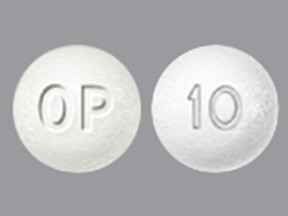
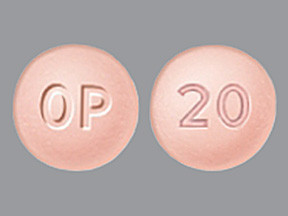
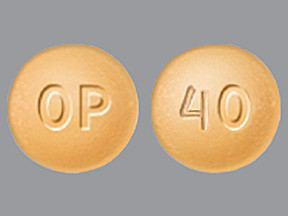
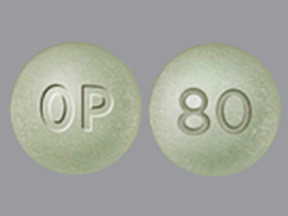
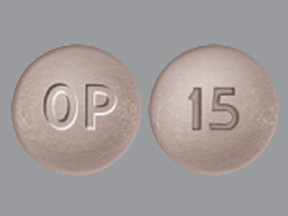
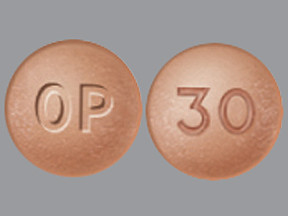
For Severe scoliosis,: Best damn pill I ever was prescribed. I have terrible permanent back pain and my doctor 20 years ago titrated me up to the max of 90 80mg oc oxycontin. It gave me my life back. I never abused em because I didnt have to. As long as I had my 3 a day, everyday, I was able to move as a teenager. Due to all the hype about oxycontin in the media and then eventually I was told by my physician that it was discontinued. He put me on these imitations they say op instead of oc. I know its still purdue but it aint the same. I needed double the amount and before you knew it I finally gave in and started taking more at each dose. It made no sense to me. People like me are being punished because certain people had to ruin it for all of us that really benefited from it. Its just a sad sad story and I was hoping it would all fade away and physicians could write opiate scripts again to people that need it. My doctor knew I had this absurdly high tolerance on all medications and safely titrated me to a perfect dose and frequency. I think of it everyday, if they never interrupted what was working for me I wonder if I wouldnt have lost my successful construction business and be where I am today. I remember watching a video recently of these people in a commercial for oxycontin and how they were so happy with the results but then they go years in the future and all of em are in bad shape. Thats the opposite with my story. It brings me to tears literally thinking about how it helped me so much handle the pain I suffer. Its about coping and it wasnt fun. This is a choice i made based on a doctors recommendation. I felt a lifetime on pain meds is worth it to have a better life. People cant imagine what its like to have such terrible pain all day and all night to the point you cant sleep without meds. The thoughts that go through your head are not pretty. God Bless Purdue pharma for creating such a wonderful medicine that helped me so much. I feel sorry for the families that lost love ones from an opiate disease or accidental toxicity and the like but does the good outweigh the bad? How can we know…? I believe the blame is not on purdue pharma for making a miracle drug that could kill but lets face it the fault is in the taker not the creator.
By JoJo on 09 Mar, 2024